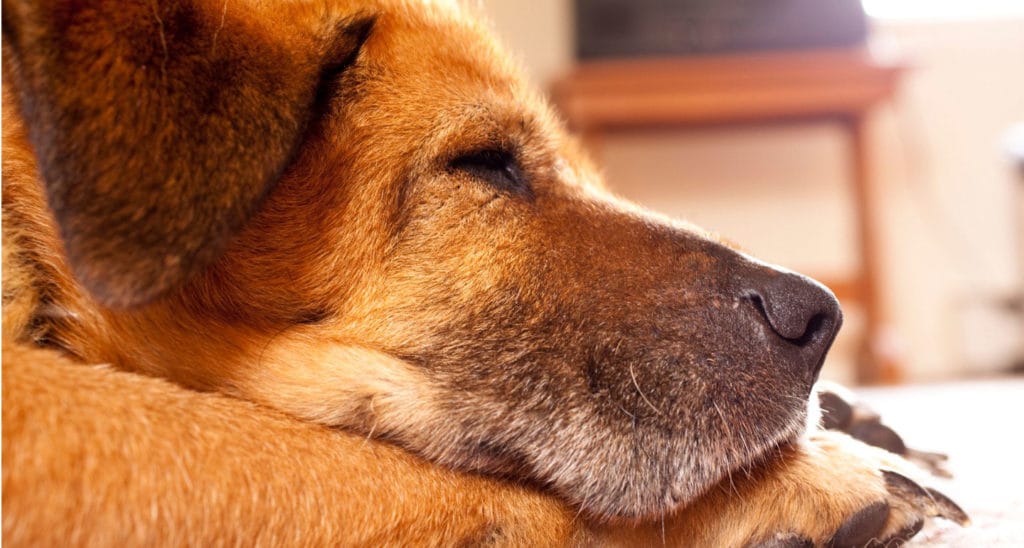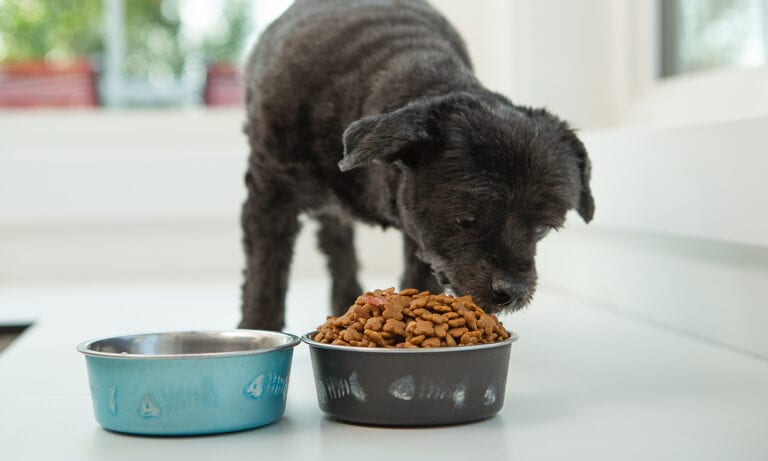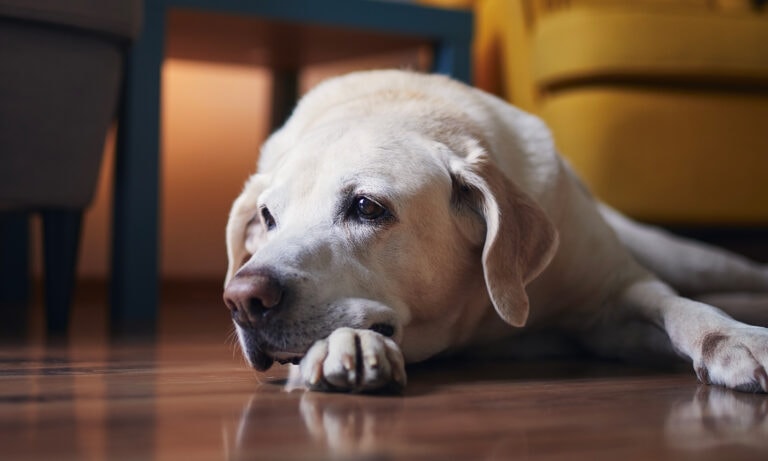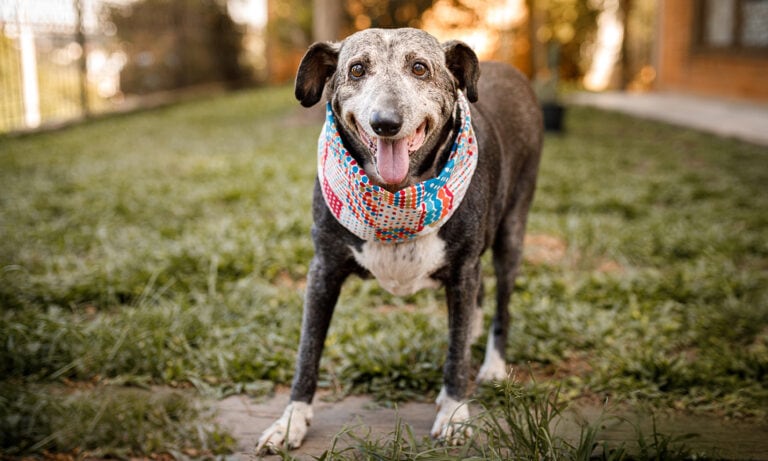In the same way humans tend to slow down as they grow older, dogs often require more rest the older they get. It might even seem like your old dog sleeps all day, in sharp contrast to their rambunctious, high-energy younger years. Though you might feel concerned with all those naps and reduced energy levels, it’s normal for your dog’s sleep patterns and general behavior to change as their muzzle goes gray.
At the same time, though, be on the lookout for signs of too much sleep. We spoke to veterinarians to learn how much sleep is normal for senior dogs and when there’s potential cause for concern.
How much sleep is normal for senior dogs?
Senior dogs tend to sleep and nap a lot, getting 16-18 hours of sleep daily, says Dr. Amber Karwacki, DVM, a veterinarian with Heart + Paw. That’s quite a bit when you consider there are only 24 hours in the day.
By comparison, the normal amount of sleep for adult dogs ranges from 8-13 hours, with adult small- and medium-size dogs sleeping less compared to large dogs and puppies.
When is my dog considered a senior?
As for when your dog is officially considered a senior, that depends on their breed. A large or giant breed of dog typically has a shorter life expectancy, so they are considered seniors around 6-7 years old. Smaller breeds tend to live longer, so they aren’t really considered a senior doggy until they’re 10-11 years old.
Regardless of when your dog is considered older, hallmarks of an aging dog tend to appear subtly. Here are some examples of canine signs of aging:
- A graying muzzle
- Reduced activity level
- Declined hearing or hearing loss
- Reduced vision or vision loss
- Slower to get up and go
- More time snoozing
- Incontinence
- More health issues
Reasons Why a Senior Dog May Sleep Too Much
As mentioned, if your older dog sleeps more than when they were a wee pup, that’s completely normal. However, there’s still such a thing as too much sleep. Here are some reasons senior dogs may sleep more than 16-18 hours.
Overstimulation
Senior pups tucker out far more quickly than their spry youngling counterparts. That said, don’t be surprised if your pooch needs extra naps after a long day, a big play session or lots of socialization. Big changes like moving into a new home, taking a vacation together, or introducing a new baby or family member to the house can wear them out.
Boredom
On the flip side, Dr. Karwacki says dogs who don’t get enough physical activity or mental stimulation can become bored or lonely. This may lead them to retreat to their cozy sleeping spot to spend the day. Make sure you’re giving your pup attention and engaging them in activities.
Medical Conditions
Oversleeping in senior dogs may be a sign of a medical problem. Any time a dog is ill or in pain, they may retreat and spend more time sleeping. Common pet health issues in aging dogs include:
- Osteoarthritis: Pain from this progressive disease that affects the joints, usually after a lifetime of wear and tear, may cause a dog to retreat and spend more time sleeping, says Dr. Laci Schaible, DVM, MSL, CVJ. Because dogs are much more stoic than we are, arthritis may easily go undetected for years in dogs. Your veterinarian will be able to diagnose this condition and provide therapy to keep your older dog’s quality of life high.
- Hypothyroidism: Hypothyroidism is common in middle-age and older dogs. It occurs when there is a decrease in thyroid hormone levels in your dog’s blood. Thyroid hormones help maintain a healthy metabolism; therefore, dogs with hypothyroidism tend to sleep more, act sluggish when awake and are prone to obesity, Dr. Schaible explains. Fortunately, hypothyroidism is easily managed with oral medication.
- Injury: Like humans, senior dogs are more prone to injury as they get older, and it takes longer for injuries to heal. If your dog is limping or has a wound, address it right away. The vet can provide medication for physical relief, and can recommend a treatment plan.
- Gastro Issue: No matter a dog’s age, dealing with gastrointestinal upset can put your pooch down for the count. Pay attention to whether your dog is vomiting, experiencing diarrhea or has decreased appetite along with their lethargy.
Canine Cognitive Dysfunction
Cognitive dysfunction can affect older dogs and is similar to dementia in people. Some classic signs of this can include:
- Reversal of day-night/wake-sleep patterns
- Progressive confusion
- Anxiety
- Aggression
- Potty accidents
- Poor adaptability to new situations
- Loss of recognition of familiar people
- A decrease or increase in the amount of affection your dog needs
If you suspect your dog is suffering from cognitive dysfunction, have them evaluated by a veterinarian. There are different therapies to help ease the severity and slow the course of this progressive cognitive disorder.
What to Do If You’re Worried About Your Old Dog Sleeping All Day
If your senior dog sleeps more than 18 hours a day or experiences a sudden change in their sleep schedule, schedule a checkup with your veterinarian. Your vet can help determine whether there are concerns regarding your dog’s health, and will come up with a treatment plan that provides your pooch some relief (and you some peace of mind).
If you suspect your dog’s behavior is due to a temporary issue, such as boredom or overstimulation, the tips in the next section can help.
4 Ways to Improve Your Old Dog’s Sleep Habits
If your senior dog has trouble snoozing, incorporate these practical options into their lifestyle and your home.
Provide a comfy dog bed.
Senior dogs typically experience some degree of lost muscle tone and joint pain. An orthopedic dog bed, such as the Frisco Chambray Orthopedic Sofa Bolster Dog Bed w/Removable Cover, is a welcome addition. Place it in a quiet place that’s still not too far from the action.
“Removable covers are good to have in case of accidents, as they can easily be washed,” Dr. Karwacki adds.
Keep exercising.
Improved muscle tone makes sleeping more comfortable for your senior dog, so keep your doggy active and at an appropriate weight. While they may have previously enjoyed intense aerobic games, long walks may now be their preferred outing. Choose activities that are gentle on aging joints but still useful at keeping off extra pounds.
Consider supplements.
Glucosamine supplements can be helpful if your dog has sore joints due to arthritis, melatonin supplements are useful to help keep your dog calm at night, and pheromone sprays or diffusers can also be used to calm your dog and allow them to sleep easier, according to Dr. Karwacki.
See your vet.
“If your dog’s sleeping habits are interrupting their normal daily activities, bring your dog to the vet,” says Dr. Karwacki. “Your vet will most likely run some blood tests along with a physical exam to make sure there is nothing medically wrong with your dog.”
The Bottom Line
Be mindful of the age-related changes your pooch will undoubtedly experience, and pay attention to signs of oversleeping so you can address them right away. The golden years of your dog’s life are very special, and there are many ways to help them—and you!—find comfort and joy in this stage.
Share:















